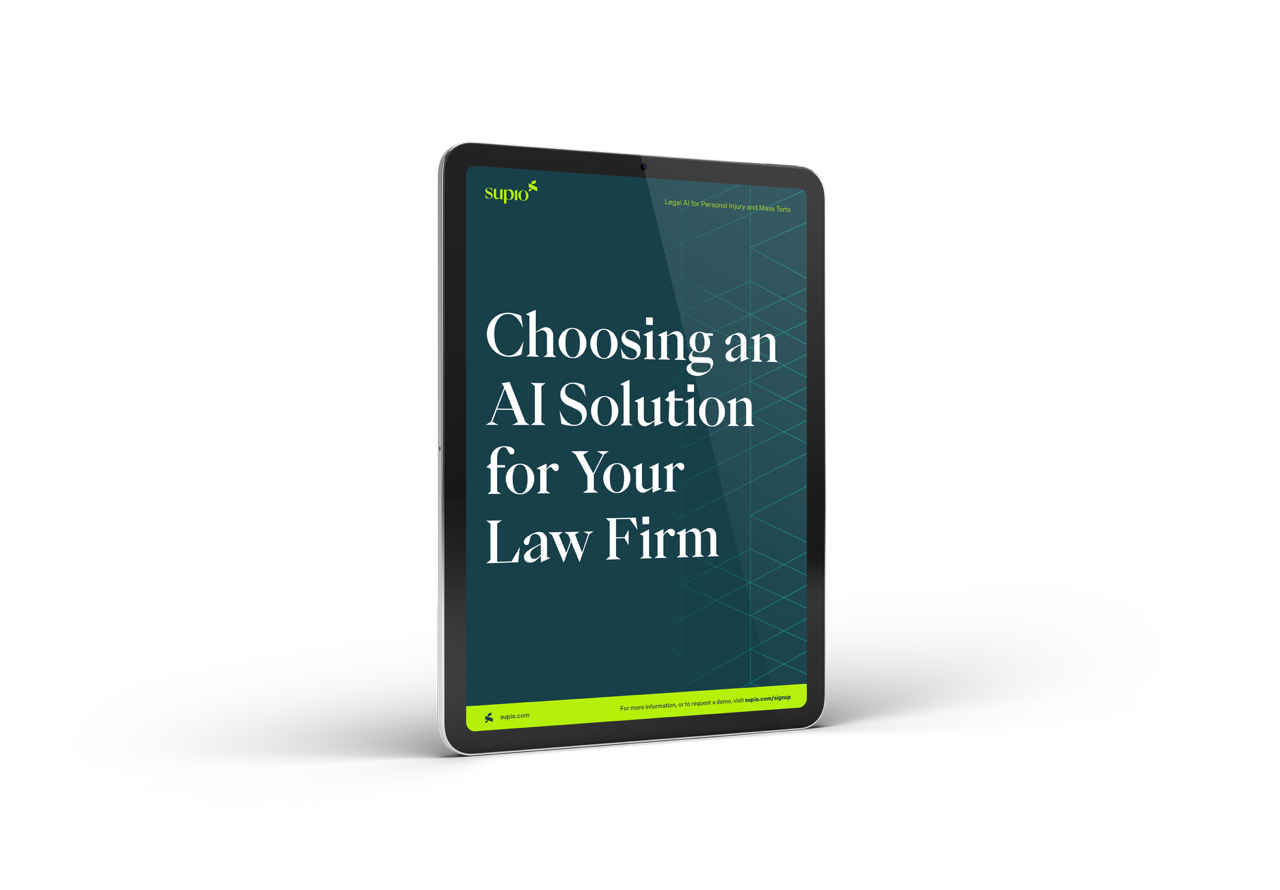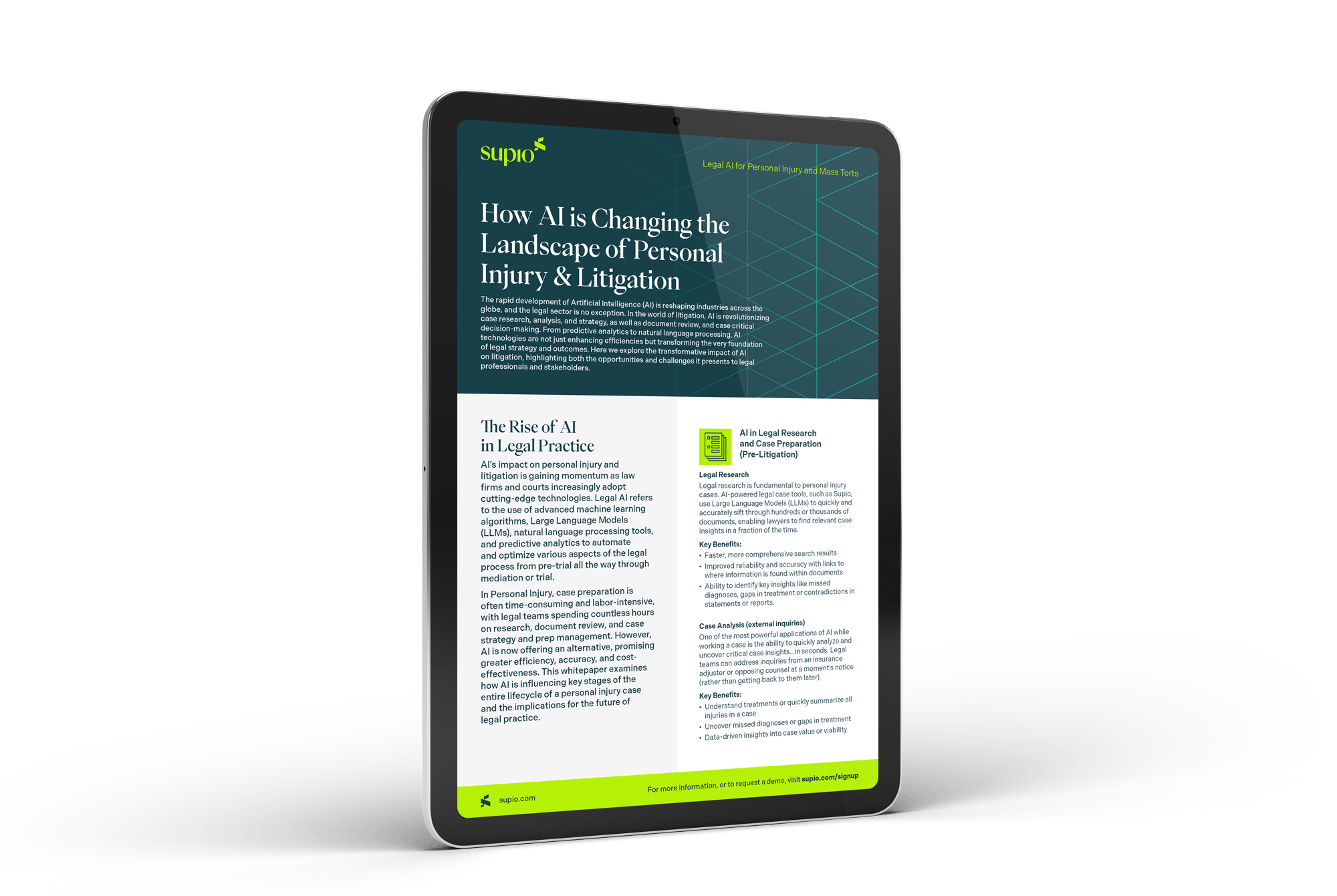
AI is here to stay - embracing the technology - and knowing what to look for and what to avoid - can help you evaluate what your firm needs to be successful.
What is AI?
Artificial Intelligence (AI) is a technology that enables computers to perform tasks that typically require human intelligence. Large Language Models (LLMs) are a type of AI that is specifically designed to understand, generate, and manipulate human language. LLM models that are trained on vast amounts of data, specific to legal, can perform tasks such as drafting documents, answering questions, summarizing information, and even conducting complex legal research when preparing a case. AI allows us to process data and spot trends far more quickly than a person could.
Why AI in Law Firms?
Get more value out of your cases
Gain critical insights to get bigger settlements for your clients. Uncover missed diagnosis or untreated symptoms to ensure your clients get the care they need.
Do more... faster
AI can generate medical chronologies you can interact with. Dive deeper with categorized, filterable, searchable and summarized details with referenceable links.
Increased efficiencies and reduction in time
Humans spend hours, days, and weeks on routine tasks like analyzing medical records and generating legal documents like demand letters, summaries, or fact sheets.
More money for your firm
Implement cost-saving measures while simultaneously increasing revenue for your firm.
Assessing AI Product Offerings
10 things to consider when choosing the right AI solution for your firm.
1. Is it secure?
- What controls and processes are in place to ensure data security?
- You need assurance that your firm and client’s data is secure.
2. Does it comply with HIPAA?
- You need assurance that your client's sensitive information is being handled securely.
- Compliance with HIPAA demonstrates the commitment to maintaining the privacy and security of your client's data.
3. Do they offer a free trial?
- You want a trial to pressure test and truly determine if this technology is right for your firm.
- Involve multiple users - case managers, paralegals and lawyers.
4. Is it accurate?
- When you trial a solution, ensure the technology and services are meeting your needs, and importantly, accurate.
5. Does it improve efficiency?
- How much time does it take to do the job currently?
- Does the technology reduce the time and free your team to work on other tasks?
6. Are there positive reviews?
- Do they have customers who rave about their technology and services?
- The right Al will share customer success stories and proven wins for their firm.
7. What is their pricing model?
- Do they have a per page cost? Those hidden costs can add up and hinder using the Al at all.
- Are there page maximums? Read the fine print.
8. Does it integrate with the current tech stack?
- The right Al will make it a seamless experience to get your medical and case documents into the technology to be analyzed.
9. Can you trust it?
- When you trial a solution, ensure the technology and services are meeting your needs, and importantly, accurate.
- The right Al will tell you where it received your information within in your documents. And the best Al, you can trust it to have in court with you.
10. What does the product roadmap look like?
- Al is continuing to evolve. Find companies who have their pulse on the market and regularly assess the effectiveness and efficiency of their Al technologies.
- The right Al will have a product roadmap that continually provides on the tools you need for your law firm.
Conclusion
AI is undeniably changing the landscape of personal injury cases and litigation. Its ability to streamline processes, enhance case research and analysis, and assist in decision-making and strategy is transforming how cases are managed and won. In order to remain competitive, legal professionals must adapt to this new era, ensuring that they harness AI's capabilities while remaining mindful of the limitations and responsibilities that come with its use. The future of personal injury and litigation is bright and lucrative for law firms.

